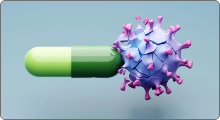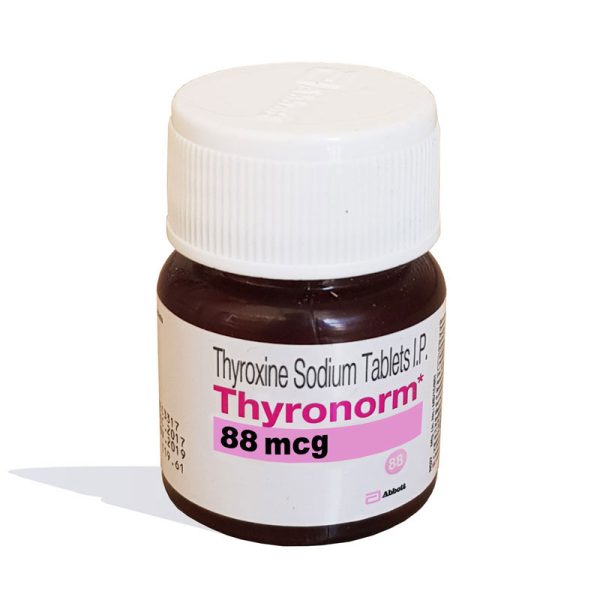Thyronorm 88 mcg
Thyronorm 88 mcg Tablet is a medicine to treat an underactive thyroid gland (hypothyroidism). It replaces the hormone that your thyroid gland is not provided in enough quantity and helps regulate your body’s energy and metabolism.
- Category : Thyroid
- Manufacturer : Generic
- Active Substance : Thyroxine
- Customer Rate
- Prescription : Required or Will Provide upon Online Doctor Consultation
INTRODUCTION
THYRONORM 88MCG TABLET contains Thyroxine which belongs to the group of medicines called Thyroid hormone receptors. It is used as a replacement therapy in the treatment of primary (thyroidal), secondary (pituitary) and tertiary (hypothalamic) congenital or acquired hypothyroidism.
It is also used as an adjunct to surgery and radioiodine therapy in the management of thyrotropin-dependent well-differentiated papillary or follicular carcinoma (a differentiated thyroid cancer where cancer develops from the follicular cells and grow slowly) of thyroid gland.
Hypothyroidism is a condition in which the thyroid gland doesn’t produce enough thyroid hormone in the blood stream. It is characterized by symptoms such as weakness, increased sensitivity to cold, constipation, dry skin, weight gain, puffy face, hoarseness and muscle weakness.
THYRONORM 88MCG TABLET is not recommended for use if you had a heart attack, acute myocarditis (inflammation/swelling of the heart muscle) or acute pancarditis (general inflammation/ swelling of the heart) recently.
Before taking this medicine, inform your doctor if you are having severe liver disease such as liver cirrhosis, kidney problems such as renal impairment, end-stage renal disease, nephrotic syndrome, renal failure, other heart problems, history of heart attack and/or history of kidney transplant.
It is not recommended for use in patients with overactive thyroid gland or untreated adrenal insufficiency (inability of adrenal glands to make enough of the hormone cortisol).
THYRONORM 88MCG TABLET should be used with caution in pregnant and breastfeeding women. It should be used with caution in children and adolescents (aged below 18 years) and elderly patients (aged above 65 years).
The most common side effects associated with the use of THYRONORM 88MCG TABLET are skin rash, itching and mild leucopenia (reduced white blood cell count). Consult your doctor if any of these symptoms worsens.
USES OF THYRONORM 88MCG TABLET
- Treats primary, secondary and tertiary congenital or acquired hypothyroidism.
- To manage thyrotropin-dependent well-differentiated papillary or follicular carcinoma of thyroid gland (with adjunct to surgery and radioiodine therapy)
HOW THYRONORM 88MCG TABLET WORKS
THYRONORM 88MCG TABLET works by replacing the thyroid hormone which thyroid gland fails to produce in sufficient quantity in body thus treating the symptoms of hypothyroidism.
DIRECTIONS FOR USE
Take THYRONORM 88MCG TABLET as advised by your physician. Swallow the medicine with a glass of water on an empty stomach. Administer THYRONORM 88MCG TABLET to infants and children who are unable to swallow the intact tablets by crushing it and suspending the freshly crushed tablet in a small amount of water and immediately administering the fresh suspension by dropper or spoon. Do not store the suspension.
Your doctor will decide the correct dose and duration of THYRONORM 88MCG TABLET for you depending upon your age, body weight and disease condition.
SIDE EFFECTS OF THYRONORM 88MCG TABLET
COMMON
- Skin rash
- Itching
- Mild leucopenia (reduced white blood cell count)
UNCOMMON
- Signs of agranulocytosis (deficiency of certain white blood cells) such as increased vulnerability to infection
RARE
- Hair loss
- Seizures (fits)
Stop taking THYRONORM 88MCG TABLET and contact your doctor if you experience any of the following side effects:
- Signs of heart problems such as chest pain, rapid/irregular heartbeat, pounding heartbeat and shortness of breath
- Signs of heart attack such as crushing chest pain that radiates to the left arm and/or jaw, sweating, nausea, vomiting and shortness of breath
- Signs of serious allergic reactions such as rash, raised red patches, swelling of the face, lips, tongue, or throat and difficulty swallowing or breathing
- Signs of seizure (fits) such as muscle twitching, changes in emotions, confusion or loss of consciousness with uncontrollable shaking
- Signs of increased pressure in the brain (in children) such as headaches, vison problems or complete loss of vision, double vision, ringing in the ears or pain in the arms
- Signs of slipped capital femoral epiphysis (condition marked by weakened hip joint in children) such as stiffness/pain in the knee or groin, walking with a limp, inability to bear weight on the affected side.
- Signs of osteoporosis (condition marked by decreased bone density) such as back pain, loss of height over time, stooped posture, broken bones
WARNING & PRECAUTIONS
PREGNANCY
THYRONORM 88MCG TABLET should be used with caution during pregnancy. Consult your doctor before taking THYRONORM 88MCG TABLET.
BREASTFEEDING
THYRONORM 88MCG TABLET should be used with caution in breastfeeding women as it may pass through breast milk. Consult your doctor before taking THYRONORM 88MCG TABLET.
DRIVING AND USING MACHINES
Do not drive or operate any machines as it may affect your ability to drive and use machines while taking THYRONORM 88MCG TABLET. Consult your doctor before taking THYRONORM 88MCG TABLET.
KIDNEY
THYRONORM 88MCG TABLET is used with caution in patients with kidney problems such as renal impairment, end-stage renal disease, nephrotic syndrome, renal failure or patients with kidney transplant. Consult your doctor before taking THYRONORM 88MCG TABLET.
LIVER
THYRONORM 88MCG TABLET should be used with caution in patients with severe liver disease such as severe cirrhosis and other liver problems such as hepatic impairment. Consult your doctor before taking THYRONORM 88MCG TABLET.
ALLERGY
Do not take THYRONORM 88MCG TABLET if you are allergic to thyroxine sodium or any other ingredients of this medicine.
HEART DISEASE
THYRONORM 88MCG TABLET is not recommended for use if you had a recent heart attack, acute myocarditis (inflammation/swelling of the heart muscle) or acute pancarditis (general inflammation/swelling of the heart). It should be used with caution in patients with other heart problems such as coronary artery disease, angina or have a history of heart attack, heart disease or hardening of the arteries. Consult your doctor before taking THYRONORM 88MCG TABLET.
OTHERS
THYRONORM 88MCG TABLET is not recommended for use if you:
- Have signs of overactive thyroid gland such as nervousness, anxiety and irritability, mood swings and difficulty sleeping
- Have untreated adrenal insufficiency (a disorder marked by insufficient production of certain hormones)
- Myxoedema coma (a rare life-threatening condition of untreated hypothyroidism)
Before taking THYRONORM 88MCG TABLET, inform your doctor if you:
- Have high blood pressure
- Have blood clotting disorders
- Have psychotic disorders such as schizophrenia
- Are a post-menopausal woman and have been on long-term thyroxine sodium therapy
- Signs of malabsorption syndrome (condition marked by inability of small intestine to absorb sufficient nutrients) such as abdominal pain and distension, bloating and flatulence
- Have diabetes
- Are scheduled for any surgery
- Have nontoxic diffuse goitre (enlarged thyroid gland) or nodular thyroid disease (condition marked by thyroid lumps)
- Have hypothalamic/pituitary hormone deficiencies
- Have autoimmune polyglandular syndrome (autoimmune disorder) such as adrenal insufficiency, pernicious anaemia
- Are in weight control programme
Use in Paediatrics
THYRONORM 88MCG TABLET should be used with caution in children and adolescents (below 18 years of age). Consult your child’s doctor before administration of THYRONORM 88MCG TABLET to your child.
Use in Geriatrics
THYRONORM 88MCG TABLET should be used with caution in elderly patients (aged above 65 years). Consult your doctor before taking THYRONORM 88MCG TABLET.
INTERACTIONS
A. Drug-Drug Interactions
Before taking THYRONORM 88MCG TABLET, inform your doctor, if you are taking any of the following medicines:
- Nutritional supplements Ex. calcium carbonate, ferrous sulfate, vitamin B3 (niacin/ nicotinic acid)
- Medicines used to treat heart problems such as digitalis glycosides (Ex. digoxin), ketamine
- Medicines used to lower blood pressure such as beta blockers Ex. propranolol, atenolol and metoprolol
- Medicines used to prevent blood clotting such as blood thinners Ex. warfarin, heparin
- Medicines used to treat abnormal heart rhythm Ex. amiodarone
- Medicines used to dilate blood vessels to reduce blood pressure Ex. nitroprusside
- Medicines used to increase urine output to reduce blood pressure such as diuretics Ex. furosemide
- Medicines used to treat diabetes Ex. insulin, tolbutamide
- Medicines used to treat digestion problems such as antacids (Ex. aluminium and magnesium hydroxides, simethicone), proton pump inhibitors (Ex. omeprazole), metoclopramide, sucralfate
- Medicines used to lower high cholesterol levels Ex. colestipol, cholestyramine, lovastatin, colesevelam
- Medicines to lower levels of phosphorus in the blood Ex. polystyrene sulfonate, sevelamer, lanthanum carbonate, sevelamer
- Medicines used to treat mental health problems and seizures such antidepressants (Ex. sertraline, maprotiline, amitriptyline), lithium, perphenazine, carbamazepine, diazepam, methadone, heroin, phenobarbital, amionoglutethemide or hydantoins
- Medicines used to treat certain cancers such as tyrosine kinase inhibitors (Ex. imatinib, sunitinib), tamoxifen, 5-flurouracil, mitotane, mercaptopurine, octreotide, interferon alpha (IFN-a), interleukin-2
- Medicines used for weight loss Ex. orlistat, other diet pills
- Medicines used to treat inflammatory conditions such as corticosteroids (Ex. dexamethasone and prednisone), non-steroidal anti-inflammatory drugs (Ex. fenamic acid, phenylbutazone and salicylates)
- X-ray contrast agents Ex. iodide
- Medicines used to treat asthma or other breathing problems Ex. salbutamol
- Medicines used to treat colds, sinus problems, hay fever or other allergies Ex. cetirizine
- Medicine used to treat Parkinson’s disease and restless leg syndrome Ex. dopamine
- Medicines used to treat bacterial, viral or fungal infections such as sulfamethoxazole, rifampin and resorcinol
- Medicine used to treat HIV infection Ex. ritonavir
- Medicines used to treat tuberculosis such as ethionamide
- Synthetic hormones Ex. estrogens, somatotropin (a growth hormone), anabolic steroids or muscle building hormones Ex. asparaginase
- Other medicines used to treat thyroid problems Ex. methimazole, carbimazole, propylthiouracil (PTU)
B. Drug-Food Interactions
Avoid taking consumption of grapefruit juice and food containing soybean flour, cottonseed meal, walnuts or dietary fibre while taking THYRONORM 88MCG TABLET, as these may bind and decrease the absorption of this medicine in the body.
Overdosage:
If you or anyone else accidentally takes too much of THYRONORM 88MCG TABLET, consult your doctor immediately or visit the nearby hospital. Symptoms of overdose are weakness, increased appetite, weight loss, heat intolerance, fever, excessive sweating, headache, hyperactivity, nervousness, anxiety, irritability, emotional lability, sleeplessness, tremors, muscle weakness, muscle spasm, awareness of heartbeat, fast or irregular heartbeat, increased pulse rate, high blood pressure, heart failure, angina, heart attack, cardiac arrest, breathlessness, diarrhoea, vomiting, abdominal cramps, hair loss, flushing, rashes, decreased bone mineral density, menstrual irregularities, impaired fertility, seizures (life-threatening emergency characterized by poor circulation and decreased metabolic rate), confusion, disorientation, cerebral embolism (blockage of blood supply to brain), shock, coma, exophthalmic goitre (autoimmune disease), sleeplessness or acute psychosis.
SYNOPSIS
| Drug | : | Thyroxine sodium |
| Pharmacological Category | : | Thyroid hormone receptors |
| Therapeutic Indication | : | Hypothyroidism, papillary or follicular carcinoma of the thyroid gland |
| Dosage Forms | : | Tablet |
MORE INFORMATION
- Keep the medicine out of reach of children
- Store THYRONORM 88MCG TABLET at room temperature
Thyronorm 88 mcg Tablet is a medicine to treat an underactive thyroid gland (hypothyroidism). It replaces the hormone that your thyroid gland is not provided in enough quantity and helps regulate your body’s energy and metabolism.
Reviews
There are no reviews yet.








Reviews
There are no reviews yet.